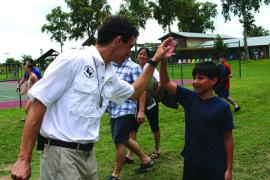Recruiting, interviewing, and hiring staff is the most important part of your job as a camp director. It is the single most time-consuming and, at times, tedious task you will undertake. However, investing the time and being truly present in the process will help you to avoid some future mistakes. Your staff are the people that families are trusting to take care of their children. They are the people that you will trust to keep your campers safe and to do the right thing both when you are present and when you are not present. There is no greater responsibility than bringing the right people to your camp.
Recruiting
The tips in this section might look familiar to the ones I presented in my November/ December 2009 Camping Magazine article, "Staff Retention, Recruiting, and Revving Up in the Off-Season," but I feel this advice is so important and relevant that it bears repeating.
- Use the Web. There are so many staff recruiting Web sites that exist that I could write a whole article just about those. Sign up for them and get on them. Check résumés. Post your needs. The power of this technology has made staff recruiting so much more accessible. However, the personal touch makes a huge difference as well. For example, whenever I get an e-mail from someone who wants me to come to their camp to do a staff training, I always follow it up with a phone call. I want my first contact with someone to be my voice and not my written words. I really believe that makes a difference when you have staff who are being recruited by many camps. The personal touch will help sell you, so let your first contact be a phone call, instead of an e-mail.
- Get educated. If you have a local college nearby, go there and get on campus. However, you need to have a specific plan. As a teacher, I've always believed that "teachers-to-be" make great camp staff. So, going to a college is a great idea, but you need to get to the right people. Contact the chairperson of the education department and ask to set up a table in the education building. You may get the "we offer a career day" runaround, but that's what you're trying to avoid. You want a day or a place on campus where you are "the only show in town." Perhaps in exchange for an exclusive day on campus, the college can send a representative from the admissions department during the summer to talk to your younger staff who are juniors in high school and are looking for a college.
- "Tell me who your friends are and I'll tell you who you are." Ask the staff that you are definitely bringing back for another season if they have friends who want to work at camp. Great people usually spend time with great people. It's that simple.
- Get local. At the high school where I teach, our hometown recreation department makes announcements every year about the opportunity to work at camp for the summer. Why not do this at your local high schools? If you hire upper-grade high school students, arrange a visit with local schools where you can be present during lunches to give out some information about your camp. Sometimes you don't have to look very far to find great staff.
- Look inward. I work with one client currently who only hires staff if they have been a Counselor in Training (CIT) in their program. Their thought process is "we know how they have been trained, they know camp, and we now know them." It's obviously working; the camp has done it this way for many years and they always have a full enrollment.
Interviewing and Hiring
If done right, this process is, at best, timeconsuming — and at worst, all-consuming. However, go back to the opening paragraph of this article. Need I say more?
Some interview basics:
- Always start with this question: "So, what do you think of kids?" I know it seems super simple, but you can begin to eliminate people immediately with this one simple question. If they don't come up with answers like: "Kids are awesome. They do something different every day. I love being a role model for them. They're funny," and so on, you know you have your answer. I have legitimately interviewed candidates and gotten responses to this question like: "They're OK," or, "I hadn't really thought about it before." Really? You hadn't really thought about it? You want to work with kids and spend eight weeks in the woods with them and you "haven't really thought about it"? Simple question; big results.
- Always finish with this question: "If you could build a house out of totally edible products, what you build it out of and why?" Great question. What are you asking this for? I've found it to be a great test of creativity and reflective thought. I've also found it to be a great test of flexibility. I've had some candidates who can't come up with an answer. They are simply stumped. And one time I had a gentleman who I hired on the spot, when in less than five seconds he blurted out, "Bamboo." I'm thinking to myself: "Bamboo? What the heck?" So I asked: "Why Bamboo?" His response: "It's an edible product, although not very tasty to humans, and it's incredibly strong." He was interviewing for my camp wilderness adventure leader position. Hired!
- Google your candidates. Google their names, hometown, the college they attend, the high school they went to, etc. Tell them you will be Googling them as well. You want to be totally up front with them. You will be amazed at what you find in some cases. You will find interviewees who hold back useful information, like they were the captain of a team or they completed a marathon. You will also find candidates who withhold some less than favorable information, such as that arrest for "being in the wrong place at the wrong time." Very useful tool.
- Ask them about their Facebook page. Ask them what's on it, what the pictures are, what groups they belong to, and why. Tell them you'd like them to pull up their Facebook page for you on the spot if they are in your presence. If it's a Skype or phone interview, ask them to friend you within five minutes of the interview ending. Some people think this is taking things a little too far, but what people are willing to let the planet see about them tells a lot about them.
- Reference checks. If you are going to use reference checks, do some research. Call people who the person hasn't put down as reference. It's pretty simple. If the candidate goes to JFK High School in Burlington, Massachusetts, pick up the phone and call the principal. Who cares who he or she put down for a reference check? Those people are always going to say great things. To really find out about someone, dig a little deeper.
- Look for hands on experience with kids. Kids are your staff 's number one priority. They may have awesome outdoor leadership experience or they may be a fantastic soccer player, but none of that matters if their experience doesn't correspond to working with kids. A perfect example of this is when I went to college. I had a few education/teaching major friends who were amazing students. They carried a 4.0 grade point average and were very "book smart." However, when you put them in a classroom to actually work with kids, they had no clue what to do. The room was a circus. So, remember: You are looking for experience with kids.
- Start the process early! October/ November of 2010 should be your goal to begin the hiring process. The sooner you get to those great staff members, the better.
- Go with your gut. That's right. Go with that intuition that got you to the job you are in now. If you get a great feeling about someone, you get that feeling for a reason. If you get a creepy feeling about someone, you get that feeling for a reason. Trust yourself to know better.
- Get another set of eyes and opinions. For some of us who don't have an extensive year-round staff, this may be tough. However, let it be anyone. Have the candidate talk to your spouse or partner. Have the candidate call your best friend. Have him or her speak with a family member who you know and who has had a child at your camp for a number of years. Let those parents react to your candidate. It's a great way to keep families as your loyal customers and help you in the interview process.
Finally, when you get to the point where you are ready to hire someone, offer them the job quickly. You will be able to do this with some people immediately. If you are not picking them up, then someone else will be. Get on it fast. Your staff is only as great as you make them. So invest time, and it will pay huge dividends.
Stephen Maguire is a full time public school teacher, professional speaker, and summer camp consultant. He works with camps across the United States and presents at American Camp Association conferences. He is also author of the book No One Likes You! Contact Maguire online at www.maguirepresentations.com or maguirepresentations@mac.com, or by phone at 781-545-5266.
Originally published in the November/December 2010 Camping Magazine.



